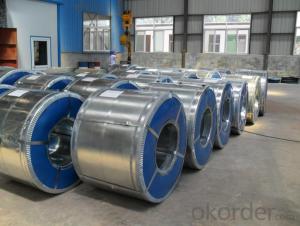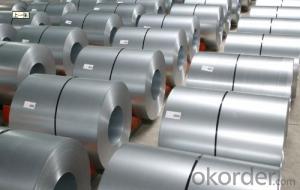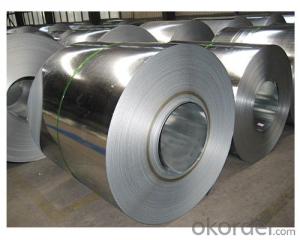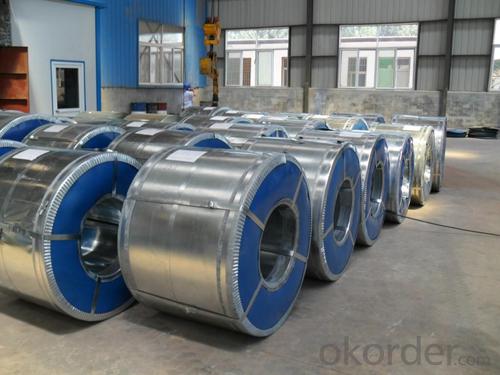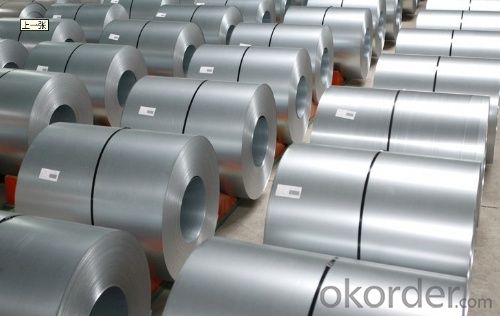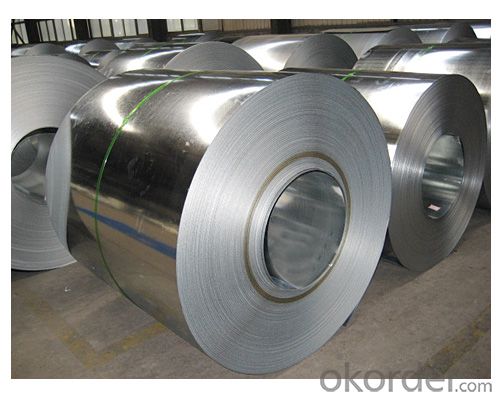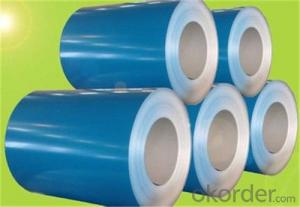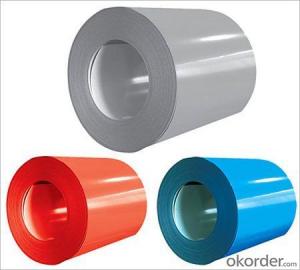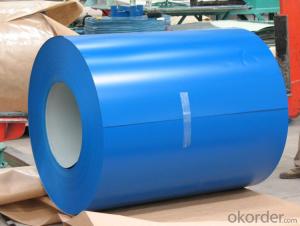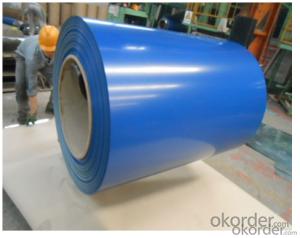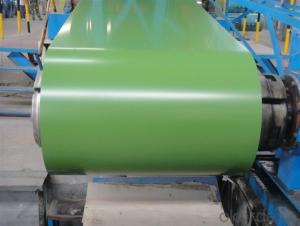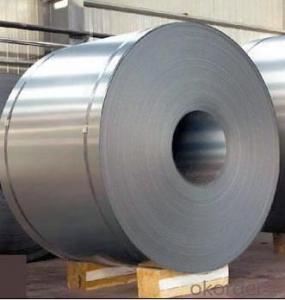Prime Prepainted galvanized steel coils
- Loading Port:
- China Main Port
- Payment Terms:
- TT OR LC
- Min Order Qty:
- -
- Supply Capability:
- -
OKorder Service Pledge
OKorder Financial Service
You Might Also Like
1) AVAILABLEDESIGNATION OF (Prepainted galvanized steel coils) printed PPGI coils
Quality Q/BQB440-2003 JIS G3312-1994 EN 10326-2004 ASTM A653-02a
EN 10327-2004(BASE PLATE)
(BASEPLATE)
Commercial SteelTDC51D CGCC DX51D+Z/AZ CS Type A/B/C
Forming Steel(TSt01,TSt02,TSt03) CGCD1 FS Type A, Type B
Drawing TDC52D/TDC53D - DX52D+Z/AZ DDS TYPE A/C
Steel DX53D+Z/AZ
StructuralTS280GD(TStE28) CGC400 S280D+Z/AZ SS275
SteelTS350GD(TStE34) CGC440 S350D+Z/AZ SS340 Class1
2) OURSPECIFICATION OF (Prepainted galvanized steel coils) printed PPGI coils
Available Size:
ManufacturerThickness Width Length of plate Inner diameter of coil
JIANGSU HUIYESTEEL SHEET CO.,LTD 0.2-1.2mm 800/914/1000/1200/1219/1250mm 1000-6000mm508mm/610mm
Coated Mass OF(Prepainted galvanized steel coils) printed PPGI coils:
Base plateAvailable Coated Mass(g/m^2)
Galvanized Steel80, 100, 120, 160, 180
Galvalume Steel50, 70, 150
AvailablePainting OF (Prepainted galvanized steel coils) printed PPGI coils:
Category ofPainting Item Code
Polyester PE
High-durabilitypolyester HDP
Silicon modifiedpolyesters SMP
Polyvinylidenefluoride PVDF
Easy-Cleaning —
PaintingThickness Top side: 20+5microns;
Bottom side:5~7microns.
Color SystemProduce according to RAL Color System or as per buyer’s color sample.
Paintingstructure Top surface Bottom surface
Primer coatingNo coating 1/0
Primer coatingPrimer coating 1/1
Primer coating +Finish coating No coating 2/0
Primer coating +Finish coating Primer coating or single back coating 2/1
Primer coating +Finish coating Primer coating + Finish back coating 2/2
- Q: How are steel coils processed and treated?
- Steel coils are processed and treated through a series of steps to ensure their quality and suitability for various applications. The process begins with uncoiling the steel coil, which involves removing the outer layers of protective wrapping and unwinding the coil. Once uncoiled, the steel is inspected for any defects, such as cracks or uneven surfaces. Next, the steel coil goes through a cleaning process to remove any dirt, oil, or rust present on its surface. This is typically done using a combination of chemical cleaning agents and mechanical scrubbing. After cleaning, the coil is rinsed and dried to prevent any residual moisture from causing corrosion. Once cleaned, the steel coil can undergo various treatments depending on its intended use. One common treatment is pickling, which involves immersing the coil in an acidic solution to remove impurities and scale. This process helps to improve the surface finish and prepares the steel for further processing. After pickling, the coil may be subjected to cold rolling, a process that reduces its thickness and improves its dimensional accuracy. Cold rolling involves passing the steel through a series of rollers at room temperature, gradually reducing its thickness and increasing its strength. This process also improves the surface finish of the steel coil. In some cases, the steel coil may undergo additional heat treatment processes, such as annealing or tempering. Annealing involves heating the coil to a specific temperature and then slowly cooling it, which helps to relieve internal stresses and improve its mechanical properties. Tempering, on the other hand, involves reheating the coil to a lower temperature and then cooling it rapidly. This process enhances the strength and toughness of the steel. Once the desired processing and treatments are complete, the steel coil may be coated or painted to provide additional protection against corrosion or to enhance its aesthetic appearance. Coating processes can include hot-dip galvanizing, electroplating, or applying organic coatings such as paint or powder coatings. Finally, the processed and treated steel coils are typically cut into specific sizes or shapes based on customer requirements. This can be done using various cutting methods such as shearing, slitting, or sawing. Overall, the processing and treatment of steel coils involve a combination of cleaning, pickling, rolling, heat treatment, coating, and cutting processes. These steps are carefully carried out to ensure the quality, strength, and suitability of the steel for its intended applications.
- Q: Guitar?I have a steel- string, but prefer nylon.:)
- I like the sound of steel better, sweetie! But nylon is nice too, especially if you wanna play, but you don't want to disturb others!
- Q: How are steel coils used in the manufacturing of electrical appliances?
- Steel coils are commonly used in the manufacturing of electrical appliances as they serve as the core component in the production of electromagnets. These electromagnets are used in various applications such as motors, transformers, and solenoids, allowing for the conversion of electrical energy into mechanical energy or vice versa. The steel coils provide the necessary magnetic properties and high conductivity required for efficient operation in electrical appliances.
- Q: Can steel coils be rewound?
- Yes, steel coils can be rewound.
- Q: How are steel coils used in the manufacturing of signage?
- Steel coils are used in the manufacturing of signage as a key material for creating the durable and rigid frames that hold and support the sign panels. These coils are typically cut, shaped, and welded into the desired frame structure, providing strength and stability to the signage.
- Q: How do steel coils contribute to the oil and gas industry?
- Steel coils are an essential component in the oil and gas industry as they are used to manufacture various equipment and structures like pipelines, storage tanks, and drilling rigs. These coils provide the necessary strength, durability, and resistance to corrosion required for the harsh operating conditions in the industry. Additionally, steel coils are crucial in the transportation of oil and gas as they are used in the construction of tankers and pipelines, ensuring the safe and efficient movement of these valuable resources.
- Q: What are the different methods of steel coil surface cleaning?
- There are several different methods of steel coil surface cleaning, including mechanical cleaning, chemical cleaning, and high-pressure water cleaning. Mechanical cleaning involves using abrasive materials or brushes to remove dirt, rust, and other contaminants from the surface of the steel coil. Chemical cleaning involves using chemicals or solvents to dissolve or remove contaminants from the surface. High-pressure water cleaning uses water jets at high pressures to remove dirt and debris from the surface. Each method has its own advantages and is chosen based on the specific requirements and condition of the steel coil.
- Q: for my engineering project I have been asked to design a method of suspending a TV of weight 14Kg from a gantry, the TV must be 5m below the gantry. My team have decided to use as a suspension method a steel cylinder of outer diameter of 10cm and an inner diameter of 8, however we now need to work out both the max stress and strain and the actual stress and strain. and help would be useful
- the area of the cylinder bypass area is extensive actual its 28.26 cm^2 so if the wieght is 14 which ability the metallic consists of .5 kg/cm2 , which isn't something we enable metallic the gentle one carry as much as a million.4 t/cm2 that's 1400 kg no longer 0.5 , so dont worry urself approximately deflection....
- Q: Specifically, for the main support beam found in a basement.
- Steel is better. You can use a smaller size compared to wood, it will handle more weight and will not deflect like a lam beam can and will. I've worked in a lot of older houses and the ones with steel beams always had far less differential settling than those with wood beams.
- Q: How are steel coils inspected for width variations?
- Steel coils are inspected for width variations using specialized equipment such as laser or optical sensors that measure the width of the coils at regular intervals. These sensors provide accurate and precise measurements, allowing inspectors to identify any variations in width across the length of the coil.
Send your message to us
Prime Prepainted galvanized steel coils
- Loading Port:
- China Main Port
- Payment Terms:
- TT OR LC
- Min Order Qty:
- -
- Supply Capability:
- -
OKorder Service Pledge
OKorder Financial Service
Similar products
Hot products
Hot Searches
Related keywords
